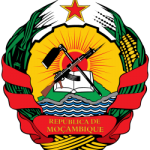ABOUT MOZAMBIQUE




OVERVIEW
Facts & Figures

Mozambique is a country rich in terrestrial, marine and aquatic biodiversity and highly committed to its conservation and preservation. So much so that 26% of the territory is covered by terrestrial conservation areas.
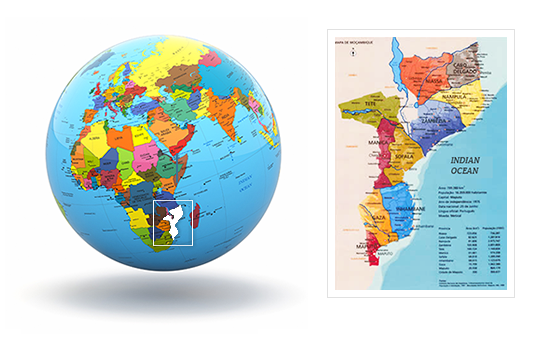

Coastline
Mozambique is a country rich in terrestrial, marine and aquatic biodiversity and highly committed to its conservation and preservation. So much so that 26% of the territory is covered by terrestrial conservation areas.
Savanna
Mozambique is a country rich in terrestrial, marine and aquatic biodiversity and highly committed to its conservation and preservation. So much so that 26% of the territory is covered by terrestrial conservation areas.
Savanna
Mozambique is a country rich in terrestrial, marine and aquatic biodiversity and highly committed to its conservation and preservation. So much so that 26% of the territory is covered by terrestrial conservation areas.
ABOUT MOZAMBIQUE
LANDSCAPE
Facts & Figures
Overview
Facts & Figures
Location
Southeast Africa
Location
Southeast Africa
Location
Southeast Africa
Population
32 Million
Population
32 Million
Capital City
Maputo
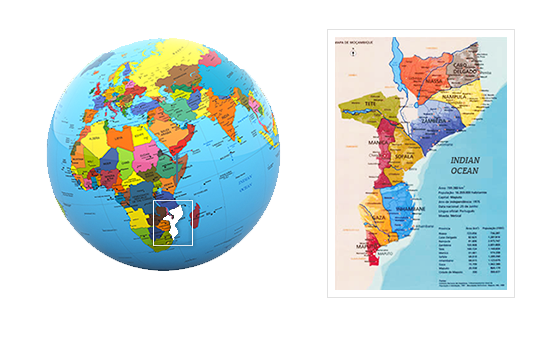

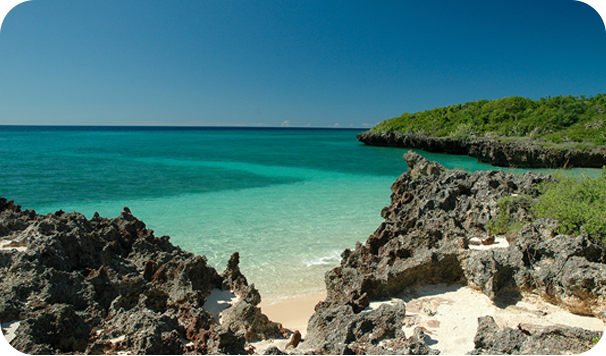




Rivers & Lakes
Mozambique has a humid and tropical climate. The average temperature ranges between 20 ° C and 31 ° C. The rainy season occurs between October and April. The summers are hot and humid with temperatures ranging anywhere from 30 to 36 °C.

BIODIVERSITY
Facts & Figures

Mozambique is a country rich in terrestrial, marine and aquatic biodiversity and highly committed to its conservation and preservation. So much so that 26% of the territory.
Coastline
Mozambique is a country rich in terrestrial, marine and aquatic biodiversity and highly committed to its conservation and preservation. So much so that 26% of the territory is covered by terrestrial conservation areas.
Savanna
Mozambique is a country rich in terrestrial, marine and aquatic biodiversity and highly committed to its conservation and preservation. So much so that 26% of the territory is covered by terrestrial conservation areas.
Savanna
Mozambique is a country rich in terrestrial, marine and aquatic biodiversity and highly committed to its conservation and preservation. So much so that 26% of the territory is covered by terrestrial conservation areas.


LANDSCAPE
Facts & Figures

Mozambique is a country rich in terrestrial, marine and aquatic biodiversity and highly committed to its conservation and preservation. So much so that 26% of the territory is covered by terrestrial conservation areas.


Coastline
Mozambique is a country rich in terrestrial, marine and aquatic biodiversity and highly committed to its conservation and preservation. So much so that 26% of the territory is covered by terrestrial conservation areas.
Savanna
Mozambique is a country rich in terrestrial, marine and aquatic biodiversity and highly committed to its conservation and preservation. So much so that 26% of the territory is covered by terrestrial conservation areas.
Savanna
Mozambique is a country rich in terrestrial, marine and aquatic biodiversity and highly committed to its conservation and preservation. So much so that 26% of the territory is covered by terrestrial conservation areas.
Location
Southeast Africa
Total Area
801,590 m²
Population
32 Million
Capital City
Maputo
Official Language
Portuguese
Currency
Metical
OVERVIEW
Facts & Figures
Location
Southeast Africa
Total Area
801,590 m²
Population
32 Million
Capital City
Maputo
Official Language
Portuguese
Currency
Metical

Location
Southeast Africa
Population
32 Million
Official Language
Portuguese
Total Area
801,590 m²
Currency
Metical
Map of
Mozambique
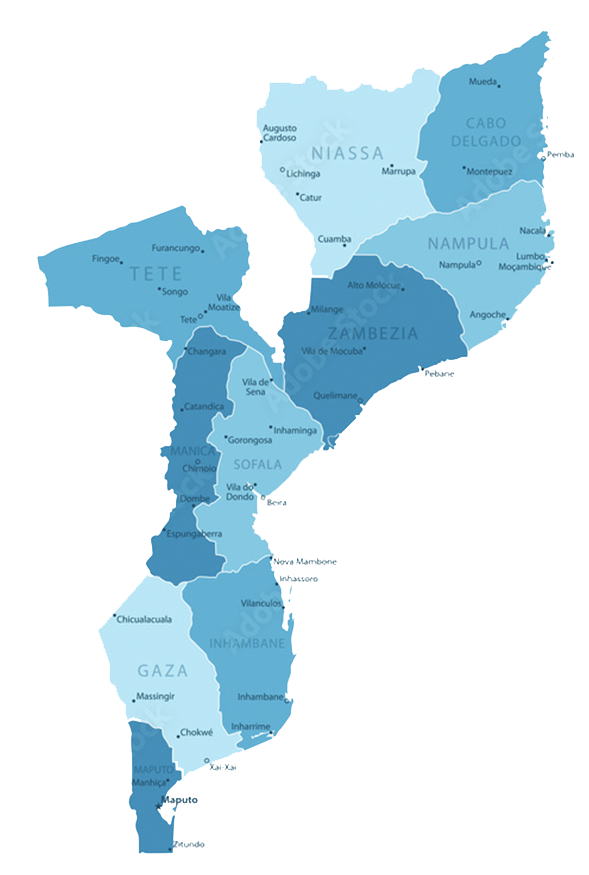
World
Location

Mozambique's
Flag & Emblem
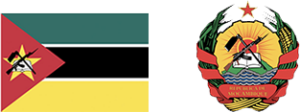
About Mozambique
About Mozambique
Location
Southeast Africa
Population
32 Million
Official Language
Portuguese
Total Area
801,590 m²
Capital City
Maputo
Currency
Metical

BIODIVERSITY
Mozambique is a country rich in terrestrial, marine and aquatic biodiversity and highly committed to its conservation and preservation. So much so that 26% of the territory is covered by terrestrial conservation areas.
CLIMATE
Mozambique has a humid and tropical climate. The average temperature ranges between 20 ° C and 31 ° C. The rainy season occurs between October and April. The summers are hot and humid with temperatures ranging anywhere from 30 to 36 °C.
Capital City
Maputo
Capital City
Maputo
Capital City
Maputo
Capital City
Maputo
Capital City
Maputo
Population
32 Million
HISTORY
Mozambique has a history of over 2000 years. The first people to settle in the present territory were the Bantu, who from the tenth century onward formed several states. The empire of Mwenemutapas was one of the main Bantu states.
Due to Mozambique's extensive coastline, from the 10th century onwards, extensive commercial contacts developed between the north and central coast, and the Arab Peninsula. Another important trading partners were merchants from the Indian subcontinent.
The arrival of Vasco da Gama in 1498 marked the arrival of the Portuguese in Mozambique. It started a gradual process of colonization and settlement which was to last for about 400 years. In 1975, following an anti-colonial war of 10 years, Mozambique became independent.
INDEPENDENCE
Following the division of the African continent by European colonial powers, during the Berlin Conference of 1885, Mozambique became a Portuguese colony. In 1964, FRELIMO (Mozambique Liberation Front), launched an armed conflict against Portugal, which resulted in its independence on 25 June 1975.
AFTER INDEPENDENCE
Mozambique's independence was followed by a civil war, from 1976 to 1992. The war was fought by FRELIMO, the ruling party, and Renamo, a rebel group backed by the Apartheid regime in South Africa, and Rhodesia. The war came to an end in 1992. A Peace Agreement was signed in Rome. The first Mozambican democratic elections were held in 1994.
POPULATION
Mozambique's population is estimated to be 32 million people, as of 2022. The population is young and rapidly growing. A third of the population is concentrated in cities. The population is mainly of Bantu origin. European, mostly of Portuguese origin, Indian, Pakistani, and Chinese communities, are also present in the country.
The country's official language is Portuguese. However, there are several native languages, spoken by large numbers of the population and protected by the constitution. These include: Xitsonga, XiChope, Bitonga, XiSena, XiShona, ciNyungwe, eChuwabo, eMacua, eKoti, Elomwe, ciNyanja, Ciyao, XiMaconde and Kimwani.
Mozambique is a multi-religious country. About 56% of the population is Christian, 18% are Muslim, 7% have other religions (mostly animism), and about 19%, according to the 2007 census, declared having no religion.
CULTURE
Mozambique is a country with a diverse and rich cultural heritage. The cultures and traditions of Bantu, Swahili, Christianity, and Islam co-exist harmoniously in the country. Ethnic groups make up a large percentage of the population and include Shangaan, Chokwe, Manyoka, Sena, and Makua. Other cultures include Europeans, Euro-Africans, and Asians.
ART
The country's rich and diverse cultural heritage, despite the variety of languages, ethnicities, and religions brings about a unique, integrated, shared, and common artistic expression. Song, dance, poetry, performance, sculpturing, painting, cuisine, and more express this rich heritage of cultural traditions.
About Mozambique
OVERVIEW
Mozambique is a country with large geographic and geological diversity. In the north, it is characterized by plateaus and mountains, while the south is dominated by a coastal plain. Major rivers flow through the country in the direction of the Indian Ocean: the Zambezi and Limpopo.






ECONOMY
According to the 2023 World Bank’s Mozambique Economic Update report, the medium-term economic outlook is positive, with growth expected to accelerate to 6% over 2023-2025, driven by continued recovery in services, increased LNG production, and high commodity prices.
Worldwide gross domestic product in 2021 was at about 12,183 USD per capita. GDP in Mozambique, on the other hand, reached USD 492 per capita, or 15.78 billion USD for the whole country. The GDP is estimated to amount to 34.85 billion U.S. dollars in 2028.
Currently, the main sector of the Mozambican economy is agriculture. However, the Mozambique government strongly encourages foreign investment, which has strengthened the sectors of raw materials, tourism, and infrastructure. The "boom" of the Mozambican economy in the last 10 years attracted many foreign investors from all over the world.
FOREIGN INVESTMENT
Mozambique welcomes foreign investment and sees it as a key driver of economic growth and job creation. Its vast and untapped natural resources, rich and beautiful coastline, favorable climate, rich soil, and strategic location is attractive to investors. The government has specific programs to attract foreign investment, including guarantees and tax benefits.
SUSTAINABLE ECONOMY
Mozambique is committed to increasing production, productivity, and employment. The main aim is to stimulate sustainable economic growth in an inclusive manner and in this way reduce poverty. This is to be achieved by means of the implementation of structuring projects. These include economic and social management projects as well as national public policies.
GOVERNANCE
Mozambique is since 1994 a democratic country. Previously, it followed a one-party governmental model. Furthermore, it is a presidential republic. The government is appointed by the President.
The current President of Mozambique is Filipe Jacinto Nyusi, Mozambique's 4th president and leader of the FRELIMO political party. The President is elected every five years. The National Assembly (Parliament of Mozambique) consists of 250 members, who are also elected every five years.
Mozambique is a member of the UN, the African Union, the Community of Portuguese Language Countries (CPLP), and the Commonwealth, and a founding member of the Southern Africa Development Community (SADC). Since 1996, Mozambique is a member of the Organization of the Islamic Conference (OIC).
EDUCATION
According to estimates, 10,595,753 persons, or 58.55% of the population in Mozambique are able to read and write. Since, the country's independence, governmental efforts to improve educational levels have proven to deliver much better results than previously. Besides the considerable increase in both primary and secondary schools, Mozambique has now several universities offering bachelor's, master's, and Ph.D. degrees.
HEALTH
One of the big challenges facing Mozambique is in the area of health, particularly in reducing child mortality and combating AIDS. Reducing child mortality is integrated into the Millennium Development Goals of the UN. Through the National Strategic Plan to Combat AIDS, the government of Mozambique is investing significant resources to reduce the incidence of this disease.
LANDSCAPE
Mozambique is a country with large geographic and geological diversity. In the north, it is characterized by plateaus and mountains, while the south is dominated by a coastal plain. Major rivers flow through the country in the direction of the Indian Ocean: the Zambezi and Limpopo.






ABOUT MOZAMBIQUE
Mozambique's
Map & Location
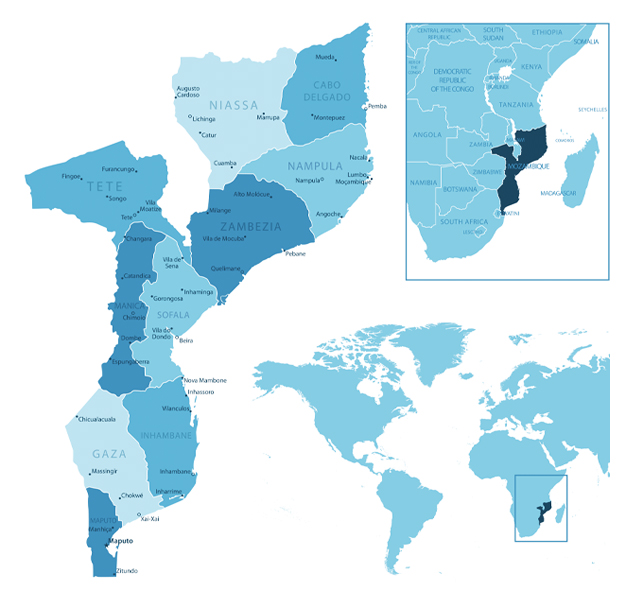
General Information
Mozambique's
Map

World
Location

Mozambique's
Flag & Emblem

Population
32 Million
Official Language
Portuguese
GDP
$40 Billion
Capital City
Maputo
Currency
Metical
President
Filipe J. Nyusi
Landscape
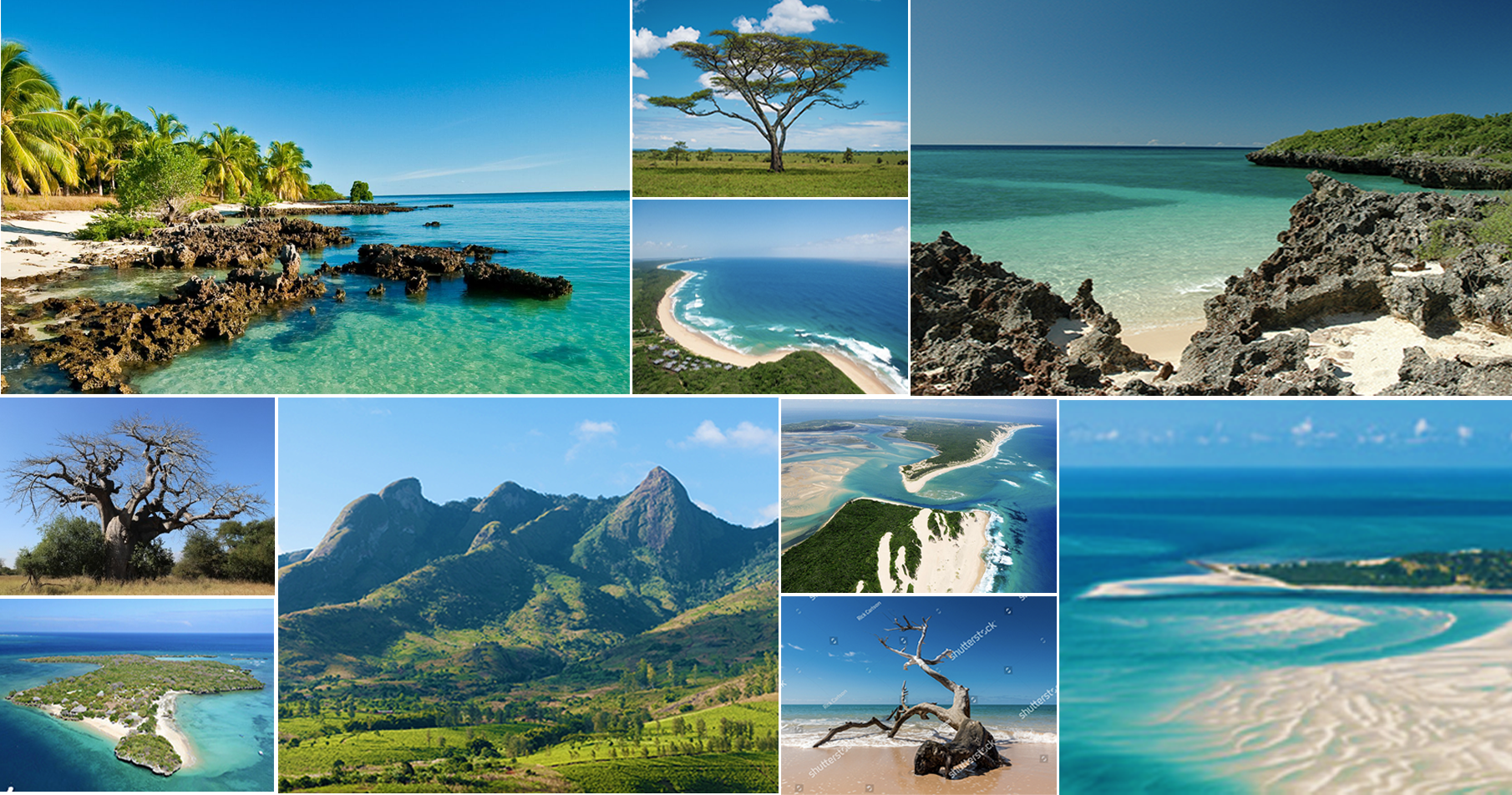
Mozambique is a country with large geographic and geological diversity. In the north, it is characterized by plateaus and mountains, while the south is dominated by a coastal plain. Major rivers flow through the country in the direction of the Indian Ocean: the Zambezi and Limpopo.
The country has a long coastline of 2700 km - one of the most extensive coastlines in Africa. Moreover, it has an inland coast, near Lake Niassa in the north of the country. Mozambique has a total area of 801,590 km2.
It is bordered by Tanzania to the north, Malawi to the northwest, and Zambia and Zimbabwe to the west; in the southwest and south, it borders South Africa and Eswatini. To the east, the country is bordered by the Indian Ocean and is separated from the Comoros, Mayotte, and Madagascar by the Mozambique Channel.
Climate
Mozambique has a humid and tropical climate. The average temperature ranges between 20 ° C and 31 ° C. The rainy season occurs between October and April. The summers are hot and humid with temperatures ranging anywhere from 30 to 36 °C.
Landscape
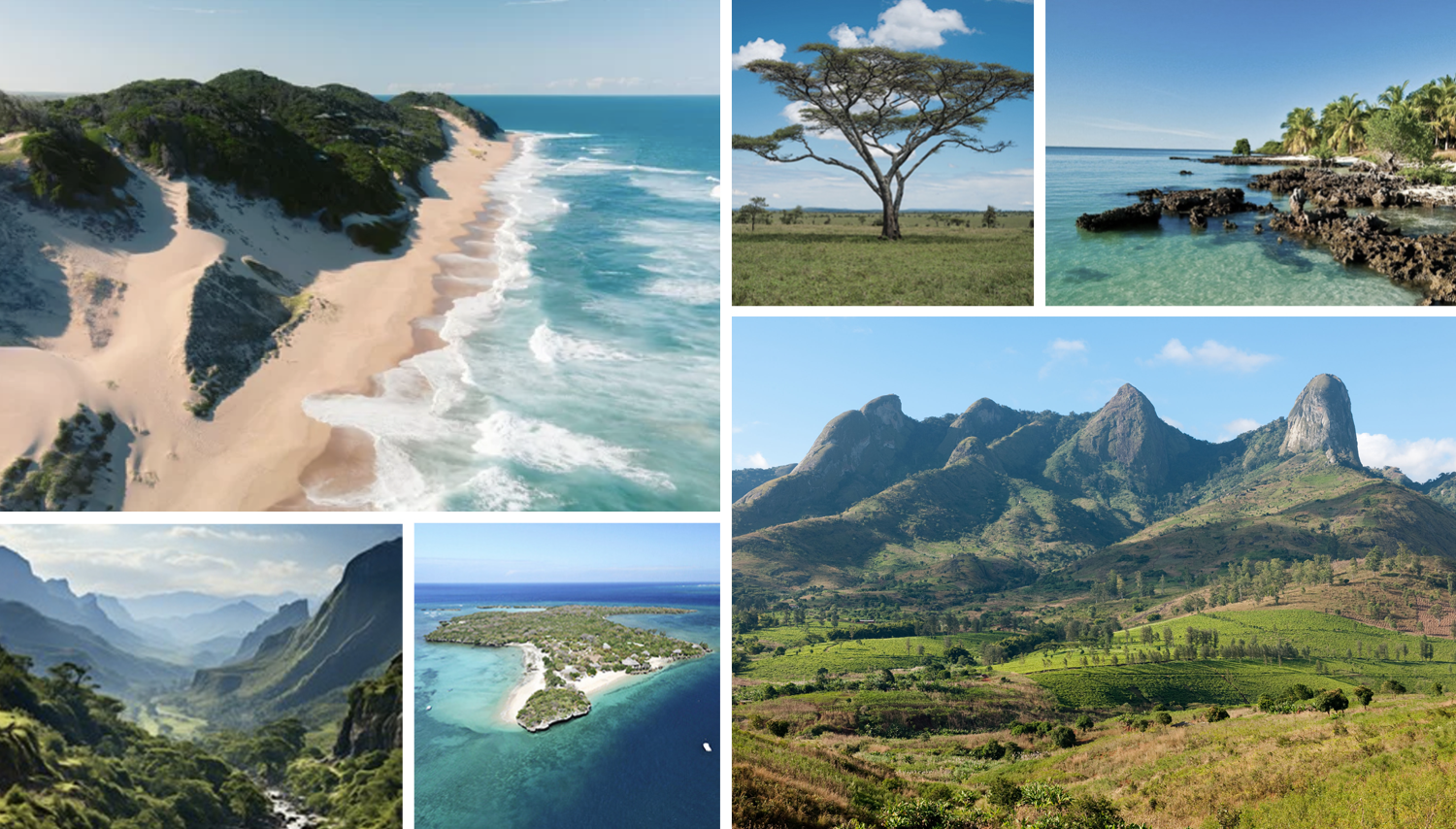
Mozambique is a country with large geographic and geological diversity. In the north, it is characterized by plateaus and mountains, while the south is dominated by a coastal plain. Major rivers flow through the country in the direction of the Indian Ocean: the Zambezi and Limpopo.
The country has a long coastline of 2700 km - one of the most extensive coastlines in Africa. Moreover, it has an inland coast, near Lake Niassa in the north of the country. Mozambique has a total area of 801,590 km2.
It is bordered by Tanzania to the north, Malawi to the northwest, and Zambia and Zimbabwe to the west; in the southwest and south, it borders South Africa and Eswatini. To the east, the country is bordered by the Indian Ocean and is separated from the Comoros, Mayotte, and Madagascar by the Mozambique Channel.
Biodiversity
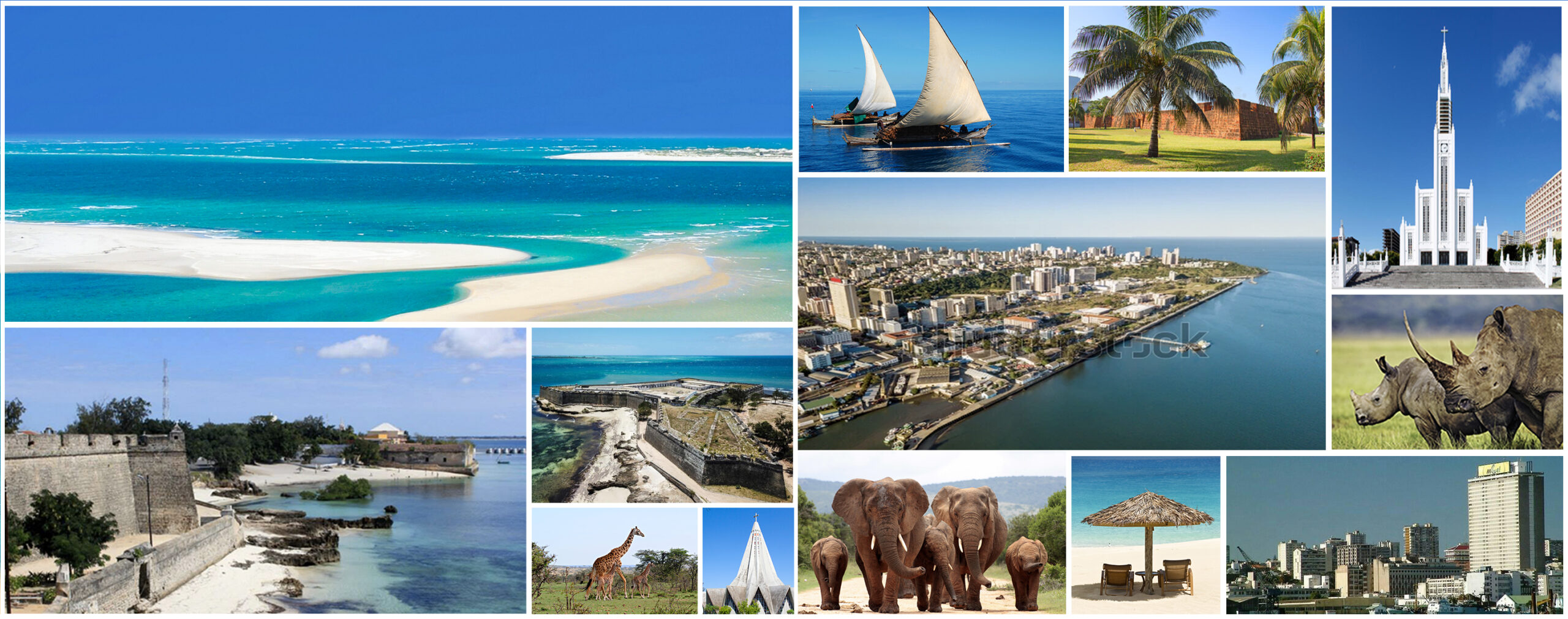
Mozambique has an extraordinary abundance of terrestrial and maritime biodiversity. According to recent studies, the country has a rich flora with over 6000 plant species, 726 bird species, 171 reptile species, 85 amphibian species, 236 mammals, and 3075 insect species. Iconic wildlife species such as elephants, buffalos, lions, and giraffes, among others, can be found in the Mozambican forestry ecosystems.
The country has a coastline 2,770 km long. It has several marine and coastal habitats, including coral reefs, mangroves, and seagrass meadows. The coral reefs cover about 1,860 km2 and there are about 400,000 ha of mangroves. Along the Indian Ocean Coast, 11,257 marine species have been recorded. Notable species that have been recorded along the coasts of Mozambique include the dugong, 7 species of dolphin, humpback whales, 77 hermatypic species of coral, and 5 species of turtle. However, a lot more species can be found.
Perservation
About 26% of the Mozambican territory is under conservation, and the network of conservation areas consists of 7 national parks, 12 national reserves, and several game hunting areas and wildlife farms. The creation of new national parks, namely, Quirimbas National Park, Limpopo National Park, and the Chimanimani National Park, and reserves, including coastal and marine environments, has significantly contributed to the preservation efforts currently being carried out by the Mozambican government.
History
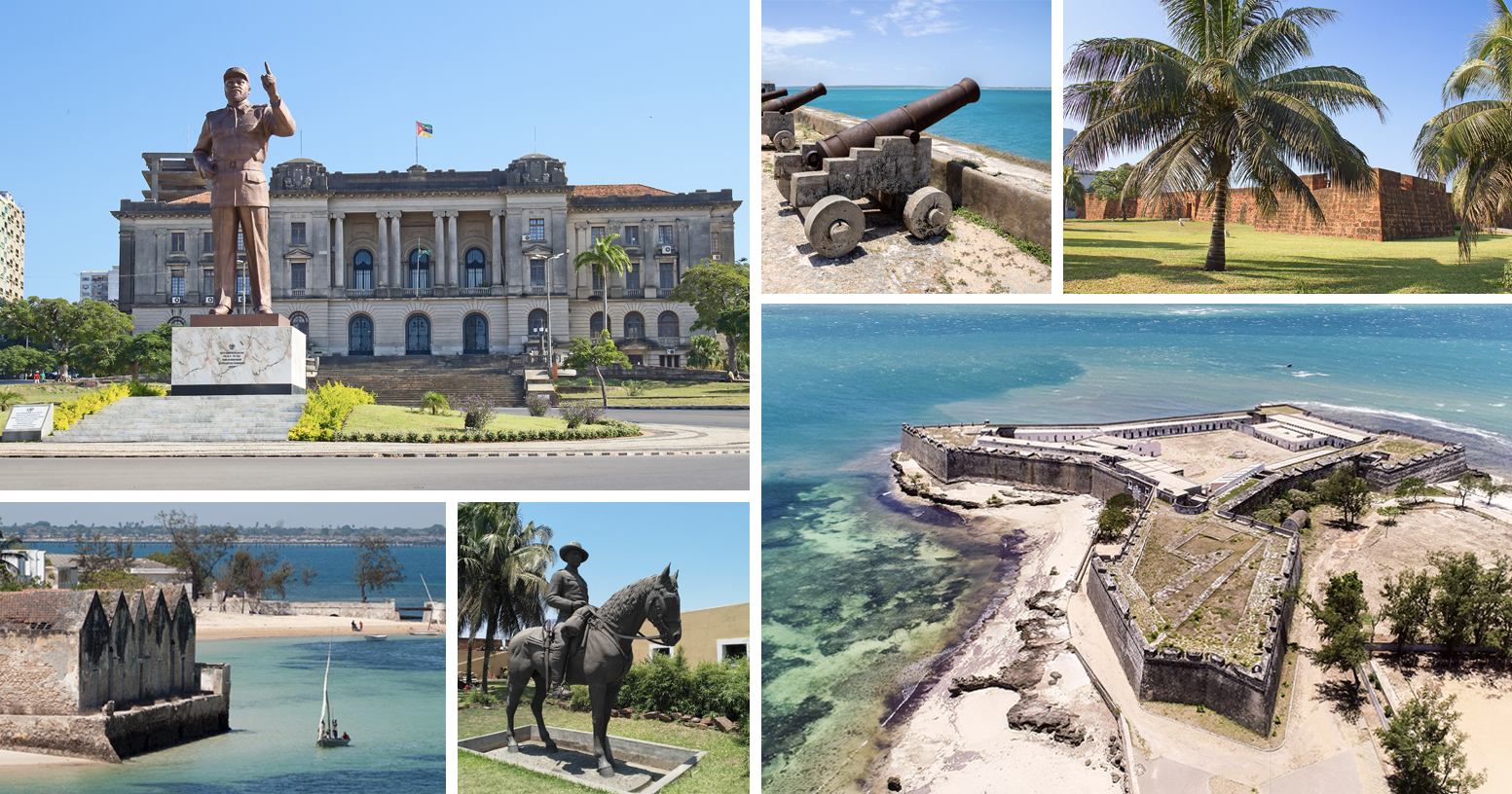
Mozambique has a history of over 2000 years. The first people to settle in the present territory were the Bantu, who from the tenth century onward formed several states. The empire of Mwenemutapas was one of the main Bantu states.
Due to Mozambique's extensive coastline, from the 10th century onwards, extensive commercial contacts developed between the north and central coast, and the Arab Peninsula. Another important trading partner was merchants from the Indian subcontinent.
The arrival of Vasco da Gama in 1498 marked the arrival of the Portuguese in Mozambique. It started a gradual process of colonization and settlement which was to last for about 400 years. Following the division of the African continent by European colonial powers, during the Berlin Conference of 1885, Mozambique became officially a Portuguese colony.
In 1964, FRELIMO (Mozambique Liberation Front), launched an armed conflict against Portugal, which resulted in Mozambique's independence on 25 June 1975.
Post-Independence
Mozambique's independence was followed by a civil war, from 1976 to 1992. The war was fought between FRELIMO, the ruling party, and Renamo, an armed rebel group backed by the Apartheid regime in South Africa, and Rhodesia. The war came officially to an end in 1992. A Peace Agreement was signed in Rome. The first Mozambican democratic elections were held in 1994.
Population
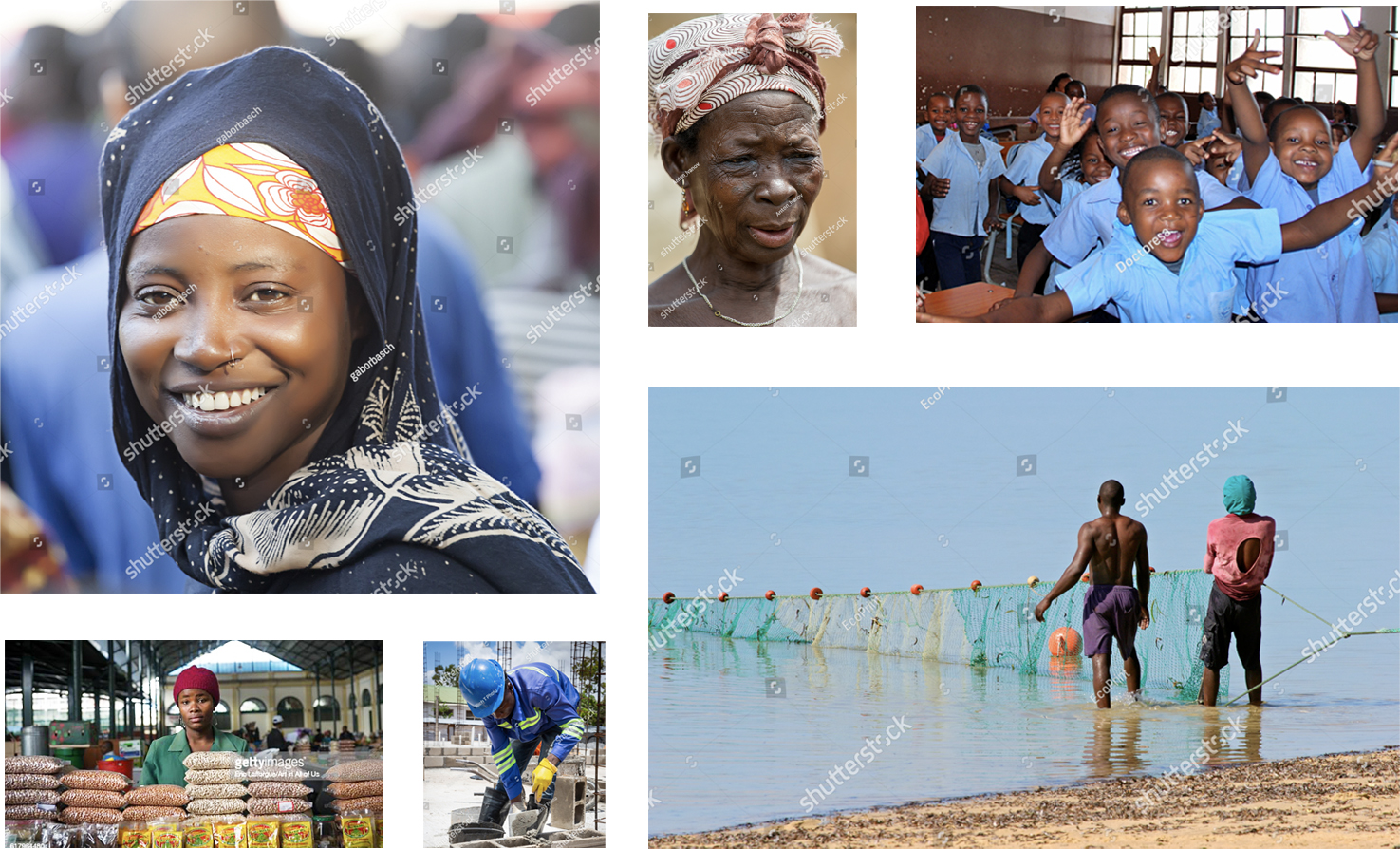
Mozambique's population is estimated to be 32 million people, as of 2022. The population is young and rapidly growing. A third of the population is concentrated in cities. The population is mainly of Bantu origin. European, mostly of Portuguese origin, Indian, Pakistani, and Chinese communities, are also present in the country.
The country's official language is Portuguese. However, there are several native languages, spoken by large numbers of the population and protected by the constitution. These include: Xitsonga, XiChope, Bitonga, XiSena, XiShona, ciNyungwe, eChuwabo, eMacua, eKoti, Elomwe, ciNyanja, Ciyao, XiMaconde and Kimwani.
Mozambique is a multi-religious country. About 56% of the population is Christian, 18% are Muslim, 7% have other religions (mostly animism), and about 19%, according to the 2007 census, declared having no religion.
Culture & Art
Mozambique is a country with a diverse and rich cultural heritage. The cultures and traditions of Bantu, Swahili, Christianity, and Islam co-exist harmoniously in the country. Ethnic groups make up a large percentage of the population and include Shangaan, Chokwe, Manyoka, Sena, and Makua. Other cultures include Europeans, Euro-Africans, and Asians.
Economy
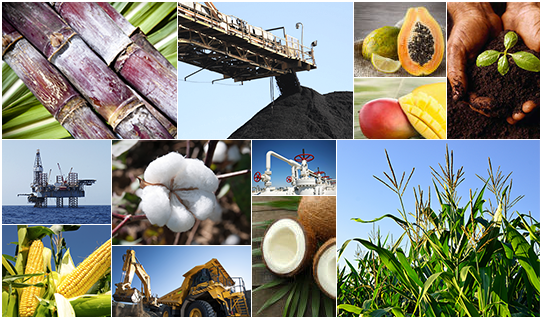
According to the 2023 World Bank’s Mozambique Economic Update report, the medium-term economic outlook is positive, with growth expected to accelerate to 6% over 2023-2025, driven by continued recovery in services, increased LNG production, and high commodity prices.
Worldwide gross domestic product in 2021 was at about 12,183 USD per capita. GDP in Mozambique, on the other hand, reached USD 492 per capita, or 15.78 billion USD for the whole country. The GDP is estimated to amount to 34.85 billion U.S. dollars in 2028.
Currently, the main sector of the Mozambican economy is agriculture. However, the Mozambique government strongly encourages foreign investment, which has strengthened the sectors of raw materials, tourism, and infrastructure. The "boom" of the Mozambican economy in the last 10 years attracted many foreign investors from all over the world.
Foreign Investements
Mozambique welcomes foreign investment and sees it as a key driver of economic growth and job creation. Its vast and untapped natural resources, rich and beautiful coastline, favorable climate, rich soil, and strategic location is attractive to investors. The government has specific programs to attract foreign investment, including guarantees and tax benefits.
Governance
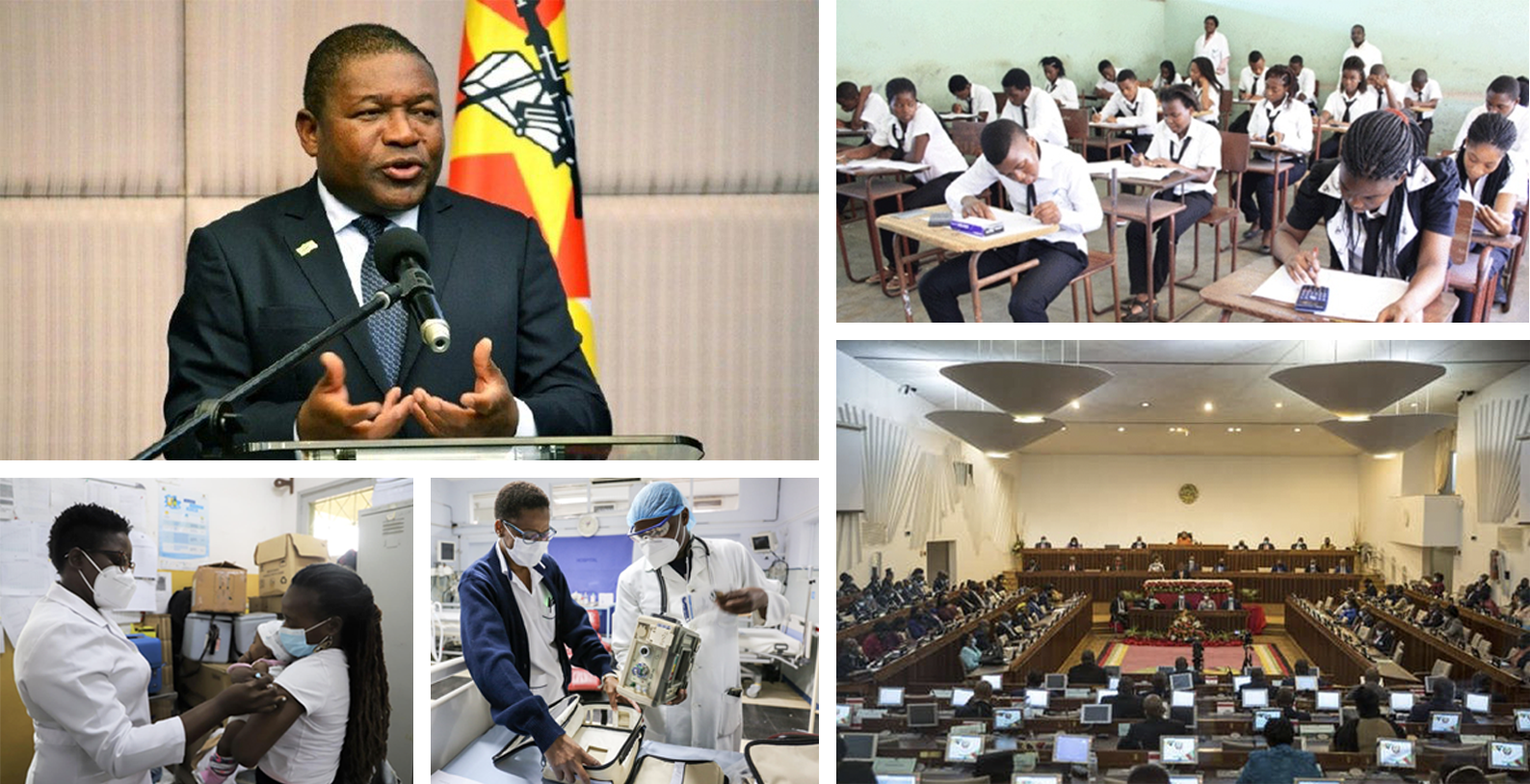
According to the 2023 World Bank’s Mozambique Economic Update report, the medium-term economic outlook is positive, with growth expected to accelerate to 6% over 2023-2025, driven by continued recovery in services, increased LNG production, and high commodity prices.
Worldwide gross domestic product in 2021 was at about 12,183 USD per capita. GDP in Mozambique, on the other hand, reached USD 492 per capita, or 15.78 billion USD for the whole country. The GDP is estimated to amount to 34.85 billion U.S. dollars in 2028.
Currently, the main sector of the Mozambican economy is agriculture. However, the Mozambique government strongly encourages foreign investment, which has strengthened the sectors of raw materials, tourism, and infrastructure. The "boom" of the Mozambican economy in the last 10 years attracted many foreign investors from all over the world.
Education & Health
Mozambique welcomes foreign investment and sees it as a key driver of economic growth and job creation. Its vast and untapped natural resources, rich and beautiful coastline, favorable climate, rich soil, and strategic location is attractive to investors. The government has specific programs to attract foreign investment, including guarantees and tax benefits.
Economy

According to the 2023 World Bank’s Mozambique Economic Update report, the medium-term economic outlook is positive, with growth expected to accelerate to 6% over 2023-2025, driven by continued recovery in services, increased LNG production, and high commodity prices.
Worldwide gross domestic product in 2021 was at about 12,183 USD per capita. GDP in Mozambique, on the other hand, reached USD 492 per capita, or 15.78 billion USD for the whole country. The GDP is estimated to amount to 34.85 billion U.S. dollars in 2028.
Currently, the main sector of the Mozambican economy is agriculture. However, the Mozambique government strongly encourages foreign investment, which has strengthened the sectors of raw materials, tourism, and infrastructure. The "boom" of the Mozambican economy in the last 10 years attracted many foreign investors from all over the world.
Governance

Mozambique is since 1994 a democratic country. Previously, it followed a one-party governmental model. Furthermore, it is a presidential republic. The government is appointed by the President.
The current President of Mozambique is Filipe Jacinto Nyusi, Mozambique's 4th president and leader of the FRELIMO political party. The President is elected every five years. The National Assembly (Parliament of Mozambique) consists of 250 members, who are also elected every five years.
Mozambique is a member of the UN, the African Union, the Community of Portuguese Language Countries (CPLP), and the Commonwealth, and a founding member of the Southern Africa Development Community (SADC). Since 1996, Mozambique is a member of the Organization of the Islamic Conference (OIC).
NON COMPLIANCE
Applicants who have been expelled, forbidden to enter the Republic of Mozambique, or declared "persona non grata" do not comply with the General Conditions for obtaining entry visas.
VISA EXEMPTIONS
Nationals holding passports from the SADC countries do not require visas to enter the Republic of Mozambique. This exemption allows foreign nationals to remain in the country for a period that cannot be extended and cannot exceed 90 days.

